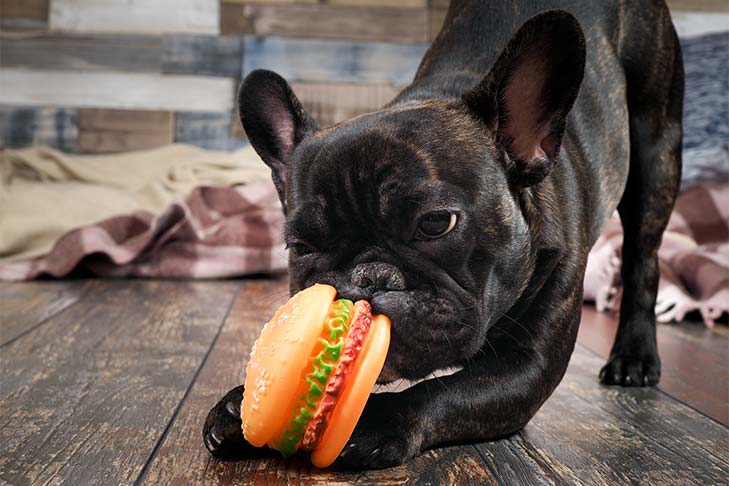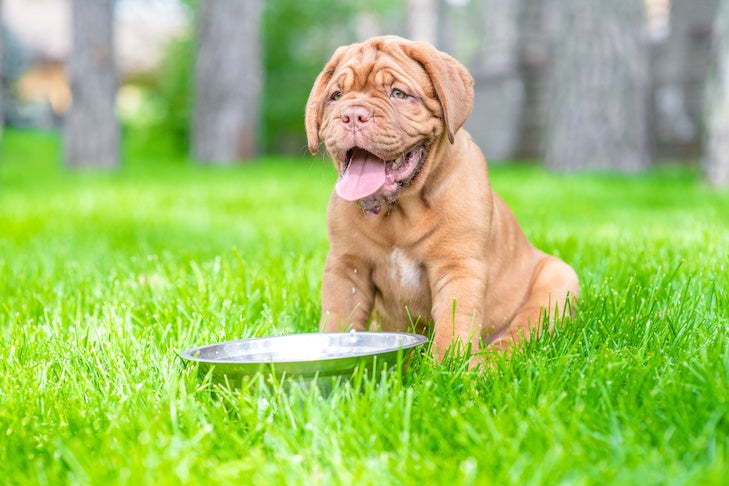- Grilled steak bones, ribs, and chicken bones cause choking and throat damage to dogs.
- Garlic and onions in any form are toxic for canine consumption.
- Licking the fatty leftovers around the grill can result in pancreatitis.
With warm weather comes the chance to fire up the grill and enjoy a barbecue. Dog owners may be tempted to let their pet have a taste of the delicious grilled foods. However, many cookout foods are not safe for dogs to eat. Here are a few tips on foods to watch out for.
Hazardous Cookout Foods
Bones
What’s better than grilled steak, barbecued ribs, or chicken wings? But sharing meat with bones in them with your dog is a dangerous idea. Dr. Jerry Klein, AKC chief veterinary officer, warns that you should never give your dog cooked bones of any kind. They splinter into shards that can cause choking and serious damage to the dog’s mouth, throat, or intestines. Moreover, some ingredients in seasoning, like salt, can be harmful to pets; others, such as garlic and onion, can even be toxic.
Raw Meat
Raw steak or hamburger patties can contain bacteria, such as salmonella and E. coli, that can be harmful to dogs and people. Keep a careful eye on the meat as you prepare the grill because the aroma will definitely get your dog’s attention, and they may try to sneak a tasty morsel.

Hot Dogs
Hot dogs often contain ingredients that are not good for dogs, such as sodium nitrate, which has been linked to cancer; monosodium glutamate (MSG); and sugars or artificial sweeteners. Hot dogs also contain seasonings, such as garlic and onion powder, that are toxic to dogs.
The biggest problem with hot dogs is salt. Feeding your dog even one-half of a hot dog would probably put them way over their daily sodium limit, and too much sodium can lead to dehydration and high blood pressure. Hot dogs can also be choking hazards.
Toppings
Garlic and onions can cause stomach upset in dogs, and sometimes have even more serious side effects. Raw or cooked, fried or powdered, onions and the rest of the allium family (garlic, shallots, leeks, and chives) are all harmful to dogs. Onions contain a toxic compound that causes a breakdown of red blood cells, leading to anemia in dogs.
Ketchup, while not toxic for dogs, is best left off of the list of foods you share with your canine pal. In addition to tomatoes, commercial ketchup typically contains garlic and onions, cinnamon, sugar and salt, preservatives and chemicals—and many of these ingredients can have detrimental effects on dogs. Mustard can also upset a dog’s stomach and cause vomiting.
Corn on the Cob
Corn on the cob is a summertime staple, and although a small amount of corn won’t hurt, you should not share your corn on the cob with your dog. There is a risk that they will choke on it, and if they ingest the cob, it can cause a serious intestinal blockage.
Salty Snacks
Potato chips, pretzels, peanuts, and popcorn—all make nice, portable snacks for humans to eat outside. But too much salt can lead to sodium ion poisoning in dogs, causing vomiting, diarrhea, tremors, fever, and seizures, and can even be fatal.
Chocolate
Whether it’s eaten in ice cream, cake, or straight on, chocolate is dangerous for dogs, and depending on the type and amount of chocolate consumed and the weight of your dog, it could cause a serious medical emergency. So the safest path is to avoid giving your dog chocolate at all times in any form.

Ice Cream
Although it’s refreshing, ice cream is a milk-based product, and dogs’ bodies are not designed to digest milk after they are weaned as puppies. Since ice cream is made with milk, feeding your dog ice cream could lead to gas, bloating, constipation, diarrhea, or vomiting.
Alcohol
An ice-cold beer, a mojito, or margarita may sound refreshing, but don’t let your pup dip into any alcoholic beverages. Alcohol toxicity is not very common, because dogs are not innately drawn to alcoholic beverages. However, they may be attracted to fruit-based drinks, cocktails, punches, ciders, seltzers, and foods with alcohol as a key ingredient. Another serious consideration is diet alcoholic beverages or other mixers that may contain xylitol. This artificial sweetener is which is highly dangerous, and even fatal, if consumed by a dog.
Caffeine
Caffeine can be fatal for dogs. This includes coffee beans and grounds, hot and iced teas, sodas with cola, energy drinks, and chocolate drinks. Dogs’ high sensitivity to caffeine can cause them to experience hyperactivity, increased heart rate, cardiac arrhythmias, high blood pressure, tremors, seizures, vomiting and diarrhea, a high fever, and coma.

Leftovers
Most dogs will be attracted to the grill, especially when you cook meat. Don’t let them lick up the fat that drips from the meat because it is rich in oils that can cause pancreatitis. Symptoms include: vomiting, diarrhea, intense abdominal pain, hunched back, weakness, and fever. Pancreatitis is life-threatening if left untreated.
If you have a charcoal grill, be aware that although charcoal isn’t poisonous, it may upset your dog’s stomach if they eat it. It commonly causes vomiting, diarrhea, and loss of appetite. Large pieces could also lead to obstruction and choking.
What Should I Do If My Dog Eats Something Toxic?
If you think your pet has gotten into something potentially toxic, call your veterinarian right away. When it happens outside of office hours or any time, day or night, weekends, and holidays, you can call AKC Reunite’s Pet Poison Helpline at 800-252-7894.
As experts on the potential danger of the substances dogs eat, the Pet Poison Helpline is the go-to resource to assist if your pet accidentally gets into something. They will recommend the necessary steps to help treat your pet. This may sometimes include getting the dog to an emergency vet as soon as possible. (AKC Reunite subscribers have lifetime access to the poison helpline for a single additional $15 fee.)
What Human Foods Can My Dog Safely Eat?
Although dog food might not be appealing to us, most options contain all of the nutrients dogs need to stay healthy. However, there are many fresh summer fruits and vegetables that are safe for you to share with your dog, such as blueberries, cantaloupe, cucumbers, and peas. For a look at fruits and vegetables that are and are not safe for dogs to eat, check here. And for a list of other types of human food your dog can and cannot safely eat, check here.

